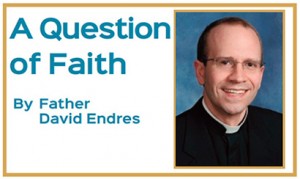A Question of Faith: What are the consequences of Adam and Eve’s sin?
Q: In Genesis 3, it is recorded that Adam and Eve ate from the tree of which God forbid them to eat from, but Eve ate first, inviting Adam to do the same. What if Eve was the only one to eat the fruit – the only one to sin? What consequences would that have had for humanity’s relationship with God?
The answer to this kind a hypothetical question is certainly in the realm of speculative theology – which is to say there is certainly not one correct answer. And we should not lose sight of the reality that both of our first parents – Eve and Adam – sinned, but neither wanted to accept culpability. From the beginning there were attempts to blame another for the sin. Adam blamed Eve and Eve blamed the snake. Interestingly enough, however, the Scriptures point to the fall of Adam and Eve as the “sin of Adam” (see Hosea 6:7; Romans 5:12; 1 Corinthians 15:22), paralleling the sin of one man with the saving action of Christ.
Still Adam and Eve’s sin is the sin of both and consequently the sin of all. The consequences of that first sin include a lack of harmony in creation; tensions in the relationship between men and women; and subjection of creation to decay, which is to say that “death makes its entrance into human history” (Catechism of the Catholic Church, 400). Their sin and the effects of that sin are felt by all, including an inclination to sin – a reality which is described by the word, “concupiscence.” Sin quickly follows upon the heels of the first sin as Cain murders his brother Abel and the rest of human history bears witness to that same proclivity: to disobey the divine.
Even if the sin of our first parents is without dispute, we can consider what might have happened if neither had sinner or if only one of our first parents had. If neither had sinned creation would have conceivably continued in its state of original harmony. Neither Adam nor Eve would have died. The redemptive quality of Christ’s incarnation would not have been necessary (though some theologians argue that the incarnation would still have occurred as evidence of God’s desire to unite to His creation). Either way, the coming of Jesus is shaped by man’s sin. Recall the tradition of the church in calling Adam and Eve’s sin a “happy fault” that “earned for us so great, so glorious a Redeemer” (see the prayer of the Easter Proclamation [Exsultet] chanted at the Easter Vigil).
However, Eve’s sin alone was enough it seems for death to enter the world and future members of humanity to be affected by sin. It could be argued that Eve would have died, but not the sinless Adam (if he had in fact remained sinless), yet we should also recall that since Adam and Eve were “one flesh,” the sin of one affected the other. Since our first parents had an obligation to keep each other from sin, the failure of one was the “fall” of both.
Adam and Eve’s sin necessitated a response from God. As St. Augustine wrote, “God judged it better to bring good out of evil than not to permit any evil to exist.” God’s allowing of free will (and consequently sin) has its remedy: Jesus, the redeemer. Jesus is the then the “new Adam” and Mary the “new Eve.” The sin of our first parents is undone by their obedience to the will of God.
We all sin and suffer from an inclination to sin, yet we also are sons and daughters of God redeemed by Jesus. Sin and death do not have the final word; redemption and the promise of eternal life have conquered sin.














